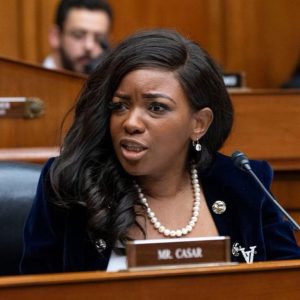Once a year, the NCAA gathers to commemorate its outstanding athletes, individuals whose lasting impact on the league is celebrated in a grand opening night extravaganza. This annual event typically unfolds with a vibrant parade on the main stage, a spectacle that illuminates the highlights of these athletes’ illustrious careers, drawing applause from the captivated audience.

However, the atmosphere took an unexpected turn during this year’s opening night when transgender swimmer Lia Thomas stepped onto the stage, sparking a wave of disapproval from certain attendees. Event coordinator Joe Barron candidly expressed, “The crowd’s reception was less than enthusiastic about Lia’s participation in the evening’s festivities.”
Among those vocalizing their discontent was spectator Riley Gaines, present to support other NCAA legends but not seeking recognition herself due to a 5th-place finish that didn’t carry much weight. In a vehement expression of her dissatisfaction, Gaines exclaimed, “She’s a cheater, not a legend,” revealing her profound disgust at witnessing Thomas on stage. “It’s appalling to witness her presence here.”
Gaines’ passionate outbursts escalated, ultimately leading to her removal from the event as her demands and protests surpassed the threshold of acceptable behavior. This incident brought to light the unfortunate reality of people finding reasons to harbor animosity and using such instances to fuel their cultural battles.
Despite the controversy and disapproving reactions, Lia Thomas remained resilient. Reflecting on the incident, she remarked that the experience served as a poignant reminder to avoid getting entangled in fictitious events propagated on social media troll pages. In the face of adversity, Thomas maintained her composure, concluding the night with a resilient spirit and extending a blessing for America.
The incident surrounding Lia Thomas not only underscored the challenges faced by transgender athletes but also ignited a broader conversation about inclusion, acceptance, and the evolving landscape of sports. As society grapples with issues related to gender identity and expression, the NCAA finds itself at the intersection of sports, culture, and social change.
Critics argue that the inclusion of transgender athletes in women’s sports raises concerns about fairness and competitive balance. They contend that biological differences between male and female athletes, particularly in certain sports, may provide transgender athletes with physical advantages that impact the integrity of the competition. This debate has led to a reevaluation of existing policies and regulations governing transgender participation in sports at various levels.
On the other hand, advocates emphasize the importance of creating an inclusive and welcoming environment for all athletes, regardless of their gender identity. They argue that denying transgender athletes the opportunity to compete based on concerns about physical advantages perpetuates discrimination and exclusion. The push for inclusive policies is seen as a step toward recognizing and respecting the rights of transgender individuals in sports.
The Lia Thomas incident has also brought attention to the role of social media in shaping public opinion and fueling controversies. The immediate and often polarized reactions on platforms such as Twitter and Instagram can amplify tensions and contribute to the polarization of public discourse. As athletes navigate the intersection of sports and social issues, they must contend not only with the challenges on the field but also with the intense scrutiny and opinions that manifest in the digital realm.
In conclusion, the annual NCAA celebration, meant to honor the league’s distinguished athletes, took an unexpected turn this year with the controversy surrounding Lia Thomas. The incident highlighted the broader challenges faced by transgender athletes and sparked a national conversation about the intersection of sports, culture, and social change. As discussions about fairness, inclusion, and the role of social media continue, the NCAA and other sports organizations find themselves at the forefront of navigating the evolving landscape of sports in a diverse and dynamic society.





